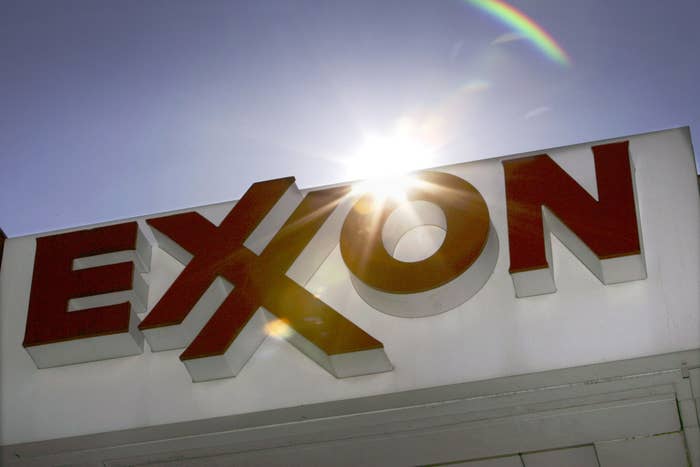
Oil industry titan Exxon Mobil kept funding a prominent climate science naysayer for years after the world's largest oil refiner claimed it had stopped supporting global warming denial, according to documents released Friday by Greenpeace and provided exclusively to BuzzFeed News.
The researcher, Wei-Hock "Willie" Soon of the Harvard Smithsonian Center for Astrophysics in Cambridge, Massachusetts, is best known for testimony before United States Congress blaming global warming on the sun. Soon is now under investigation by his employer after Greenpeace released funding records that suggest he received more than $1 million in fossil fuel industry support while not fully disclosing his funding to Congress and other scientists.
The records released Friday show that Exxon's support of Soon came despite a 2007 pledge to quit funding climate naysayer groups, according to Greenpeace's Jesse Coleman, who started the Soon records search using public records laws. "Exxon told us that they would stop funding climate denial front groups," Coleman told BuzzFeed News. "Years later, they were still funding Willie Soon."
In January 2007, Exxon's Mark Boudreaux said that the oil firm's position on climate change has been "widely misunderstood," and that it would stop funding groups that attacked climate science. But the records obtained by Greenpeace from Soon's employer show that Soon received $76,106 from 2008 to 2010, after which the firm stopped supporting him.
Boudreaux, the senior director of federal relations at Exxon at the time, signed off on that funding. "The person at Exxon that was approving this work was a lobbyist, not a scientist or someone interested in sun science," Coleman said, calling the case an example of how politics-driven corporate funding kept a fake debate over climate science alive.
Citing the revelation, U.S. Sens. Edward Markey, Barbara Boxer, and Sheldon Whitehouse on Wednesday requested funding records from dozens of fossil fuel lobbying groups and firms, including the Irving, Texas-based Exxon, detailing their support of climate change naysayers who have similarly testified before Congress.
"This kind of funding is in keeping with the sort of information we are looking for," says Eben Burnham-Snyder, a spokesman for Sen. Markey. "Our concern was that they hired people to mislead Congress."
In response, Exxon spokesperson Alan Jeffers told BuzzFeed News via email that the firm's "position on climate change is clear — increasing carbon emissions in the atmosphere are having a warming effect."
"In the past we have discontinued contributions to several public policy research groups," he added, that "could divert attention" from addressing global warming.
Burning fossil fuels such as oil or gasoline releases greenhouse gases, most notably carbon dioxide, into the atmosphere.
Industrial emissions of greenhouse gases are responsible for at least half of the roughly one degree increase in global surface temperatures seen over the last century.
Exxon CEO Rex Tillerson was a face of corporate resistance to such climate science findings in the previous decade, but he seemed to change his tune in a 2006 speech calling for funding climate research, "without conditions or preconceived outcomes."
Given Exxon's history, learning that the firm funded Soon despite the pledge to stop bankrolling climate naysayers "isn't a surprise," carbon policy expert Shanna Cleveland, of the environmental investor advocacy group Ceres, told BuzzFeed News. "This really signals the need for companies to change not only their public face on climate change but what they do behind closed doors."
Exxon was just part of a larger fossil fuel industry network that fought against regulation or pricing of the environmental costs associated with global warming, Harvard historian Naomi Oreskes told BuzzFeed News.
"Congress, and the American people, have a right to know what their role has been, and this may help us find out," Oreskes says. "For years we have had evidence of fossil fuel efforts to misrepresent and distort climate science, but it's been hard to pin down, exactly, because they often work through 'third-party allies' to hide the money trail."
At the same time, a separate investigation into climate naysayer money that was launched earlier this week by a lawmaker has drawn criticism from scientists for political overreach.
On Tuesday, Rep. Raul Grijalva, a member of the House Natural Resources Committee, sent letters to seven universities asking them to reveal the funding sources of faculty, such as MIT's Richard Lindzen and the University of Colorado's Roger Pielke Jr., who have testified in Congress in ways seen as dismissive of global warming's impacts. The letters also ask for "communications regarding the funding" of those researchers.
Grijalva cited Exxon's undisclosed funding of Soon in past congressional testimony as a reason for the inquiry.
But the move has generated blowback from mainstream scientists, with the American Meteorological Society (AMS) today saying the request "sent a chilling message" to researchers, that said scientific "peer review" of studies by other scientists is the right way to evaluate the quality of scientific work.
